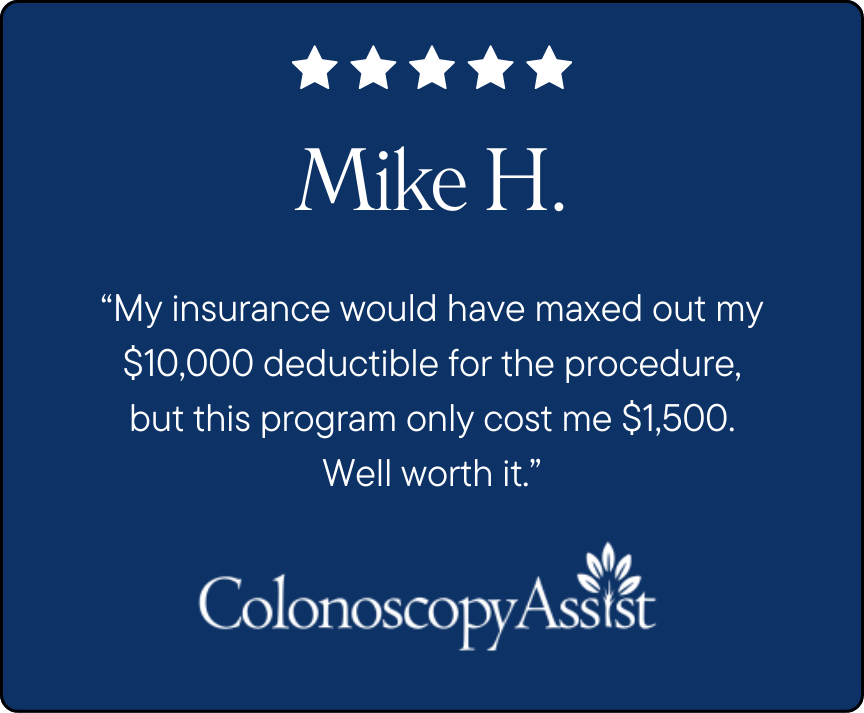Table of Contents
For many consumers, healthcare insurance can be a confusing puzzle of trying to figure out what procedures are either fully or partially covered, what costs go toward meeting the deductible allowance, what variable copays exist for different types of procedures, and what other additional or ancillary charges can exist outside of the procedure itself (lab tests, other doctors, etc.). The process can give any patient a headache.
Without that understanding, many patients can become fearful of getting a diagnostic or preventive procedure because they are afraid of surprise charges for which they hadn’t planned.
For uninsured or self-pay patients needing a colonoscopy or other GI procedure, the process may seem simpler but still requires finding affordable care close to home. ColonoscopyAssist makes it easier by providing quality care at a price patients can afford.
How Insurance Typically Covers a Colonoscopy
Although insurance plans vary, there are some general insurance guidelines:
- Preventive colonoscopy: A screening colonoscopy may be at no cost if you are 45 years of age or older.
- Diagnostic colonoscopy: If a patient has specific symptoms, such as bleeding or pain, a diagnostic screening may be ordered, but the patient may have a deductible, copay, or need to have a prior authorization before they can proceed.
Medicare Coverage
Medicare can cover colonoscopies, but even those medical bills can vary. Screening colonoscopies may be covered in full (if a Medicare-approved provider does the procedure), while a diagnostic colonoscopy may have out-of-pocket charges.
Medicare Part B is the part of Medicare that covers outpatient medical services such as colonoscopies. Biopsies and polyp removal may incur additional costs beyond just the diagnostic colonoscopy. A diagnostic colonoscopy could range from several hundred dollars to more than $1000 in out-of-pocket costs, even with Part B coverage.
Average Out-of-Pocket Cost for a Colonoscopy
In the US, costs can vary greatly depending upon the geographic area, the type of service location (hospital vs. outpatient center), the type of colonoscopy (screening vs. diagnostic), and the type of sedation utilized.
The average price of a colonoscopy is $2322, with some prices ranging as high as $6544.
At ColonoscopyAssist, we work with accredited facilities to offer lower-cost procedures with clear, upfront pricing. Many of our patients, like Mike H., see the value our program provides. As Mike shared:

Affordable Options for Uninsured and High-Deductible Plans
Like Mike H., many patients who use ColonoscopyAssist have insurance but face high deductibles. They find that our service offers the quality care they need at a lower cost. Hospitals and outpatient centers often base their prices on insurance reimbursement rates, so the quoted prices can be higher due to those practices.
The price they quote might not include a discount for self-pay patients who pay upfront. Some providers may also only accept patients who use insurance for their services.
Tips for Checking Your Insurance Coverage
The first step is to find out what the procedure will cost. For a colonoscopy, you can contact hospitals, outpatient centers, and gastroenterologists to ask about prices. Request a detailed estimate that includes any extra charges, like lab tests, anesthesia fees, and hospital fees. Ask if they have lower prices for self-pay patients who pay upfront, or if they offer financial help for patients with lower incomes.
Websites like Healthcare Bluebook and Fair Health can help you find the average price for your area and show typical charges.
Once you have some price estimates, contact your insurance company (if you have a policy) to ask about your coverage for a colonoscopy, including copays, coinsurance, and your deductible. This will give you a clearer idea of what you might pay out-of-pocket.
Final Thoughts
Whether you have Medicare or a high-deductible health plan, knowing the services and costs involved in your colonoscopy is an important first step. Combine that with a clear understanding of what your insurance will and won’t cover. With this information, you can see if ColonoscopyAssist might give you better care at a more affordable, upfront price than your insurance offers.
Early detection of colon cancer remains the most effective cure in battling this disease. Don’t let the healthcare puzzle confuse you into not getting a screening. At ColonoscopyAssist, we are your ally in getting you the care you need.


























